What does it mean to be a highly sensitive person? Do you want to know if you are one?
IDRlabs explains that people with high sensitivity are those with brains that are able to “process sensory information more deeply than others.” Often, they are misunderstood as being “shy” and “introverted.”
Being highly sensitive can be overwhelming, but that doesn’t mean it’s a problem. It’s like being a superhero with heightened senses. Highly sensitive people notice things that most others do not.
Perhaps you are seeking to determine if you are a person with high sensitivity. Fortunately, we have gathered the top highly sensitive tests you can find on the Internet today.
Let’s check them out!
1. The Highly Sensitive Person: Are You Highly Sensitive?
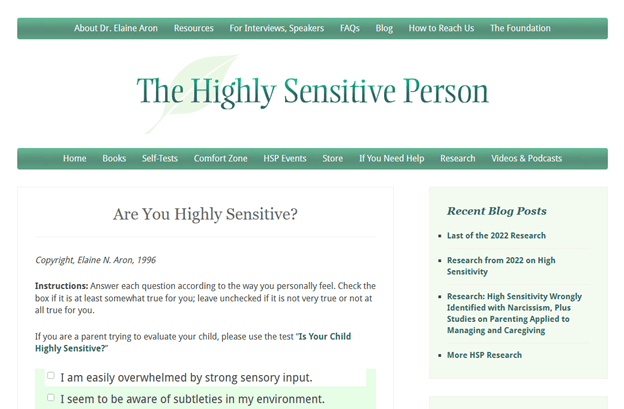
Clinical psychologist Dr. Elaine Aron is one of the pioneers in the field of psychology who studies sensitivity and relationships. She designed the The Highly Sensitive Person: Are You Highly Sensitive? test with 27 statements in the form of a checklist. All you have to do is tick off the boxes that you strongly resonate with.
If your score is 14 or above, you may be a highly sensitive person. Note, however, that scoring lower does not automatically mean you have low sensitivity. Even if you only checked two items on the list, if they are extremely true for you, you may still be highly sensitive.
A better version (in PDF form) is offered for researchers who wish to use the test for academic purposes. If you are using the test for anything besides research (e.g., publication), you need to obtain permission from the American Psychological Association (APA).
2. The Highly Sensitive Person: Is Your Child Highly Sensitive?
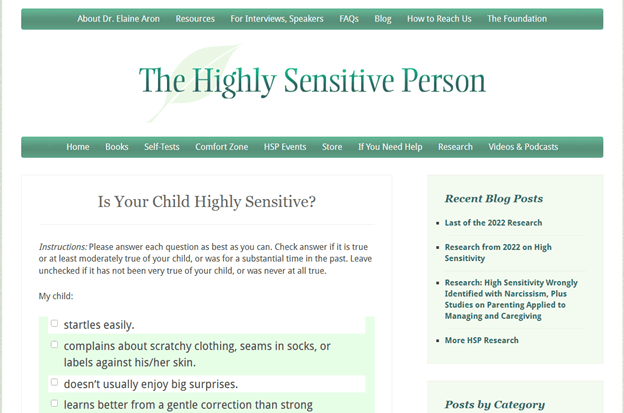
The Highly Sensitive Person: Is Your Child Highly Sensitive? test is designed specifically for parents who feel like they have highly sensitive children. There are only 23 items on the list, but the instructions are the same as the previous quiz. You just need to check off those that apply to your kids.
If your child scores 13 or higher, then they may be a highly sensitive individual. If not, that does not necessarily mean they have low sensitivity. Even if they only score four or five, if the statements are extremely true for them, they could still be highly sensitive.
3. Sensitivity Research: Test for Adults (18+)
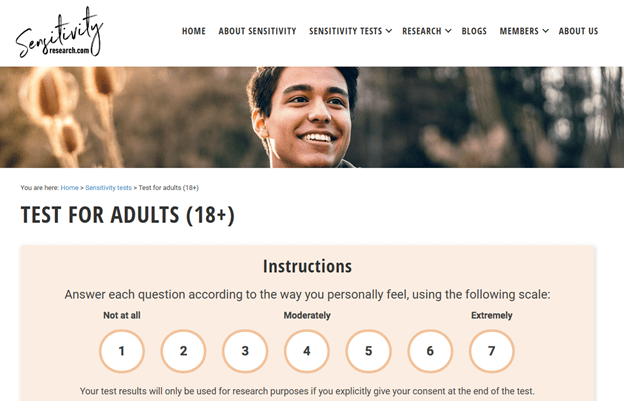
The Sensitivity Research website dedicates itself to communicating evidence-based knowledge focused on sensitivity. It aims to educate the public, contribute free resources, and encourage collaboration among researchers on an international level.
The website offers various tests relating to sensitivity. This Sensitivity Research: Test for Adults (18+), in particular, is for adults ages 18 years old and above. It offers a Likert scale from 1 to 7, with 7 indicating strongly agree and 1 indicating strongly disagree.
Once you have completed the quiz, a consent form will give you the choice to be part of their research. You also have the option to send your results to your email.
The results indicate where you are on the sensitivity spectrum. It also shows how many people are like you, based on the study’s population. An explanation is given on what it means to belong to that area of the spectrum, whether you are a “dandelion,” “tulip,” or “orchid.”
4. Sensitivity Research: Test for Children (8-18 years)
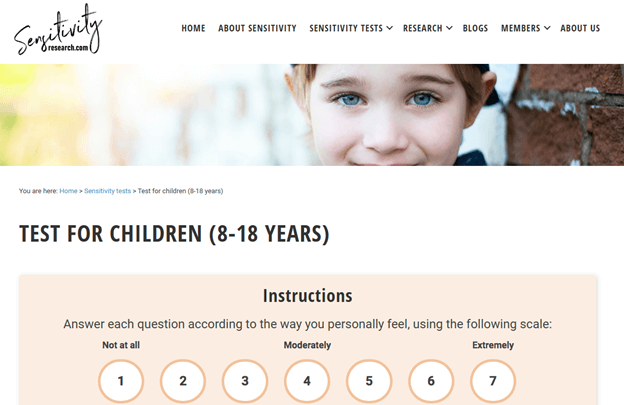
This Sensitivity Research: Test for Children (8-18 years) version of the previous test that is dedicated to children between 8 to 18 years of age. The instructions, question pattern, and results are all the same. The only difference is that the questions are a lot easier to understand, as they are made for kids.
You will not find the consent form on this quiz, as children’s results are not used for their research. Rather, you will receive a nudge informing you that nothing is ever saved on their database. It will, however, still ask if you want a copy of your results sent to your email.
5. Highly Sensitive Person (HSP) Test by IDRlabs
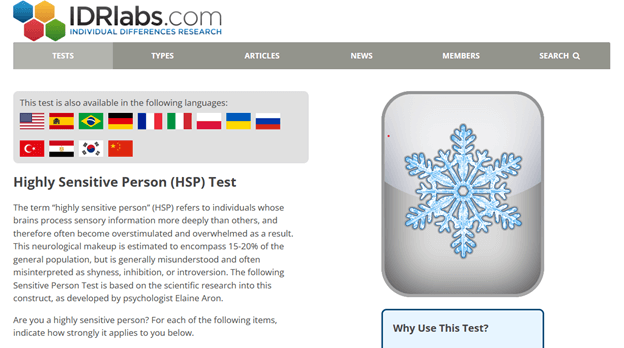
IDRlabs has created its own version of the test, although it is greatly influenced by Dr. Aron’s version. It also references other research materials to make the questions more comprehensive.
This Highly Sensitive Person (HSP) Test by IDRlabs includes 26 well-crafted questions. Unlike the HSP Scale by Dr. Aron, it provides a Likert scale instead of a checklist. The choices include strongly agree, agree, neutral, disagree, and strongly disagree.
The results show where you are on the spectrum and how you score compared to the average person. They also give you a breakdown of other important information that falls under the topic of sensitivity (e.g., ease of excitation, aesthetic sensitivity, and low sensory threshold).
6. The Highly Sensitive Person Test: Find Out If You're An HSP
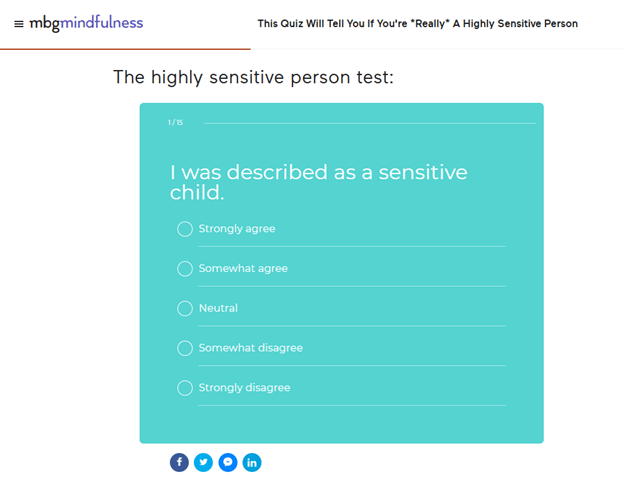
This The Highly Sensitive Person Test: Find Out If You're An HSP from Mind Body Green consists of 15 questions. Like many of the others above, it uses the Likert scale, giving you the five usual choices. The results provide a simple indication of whether or not you are a highly sensitive person.
Note that you may not go back once you proceed to the next question. If you do so, you will have to repeat the whole process. Thus, it is important to think about your answers carefully before proceeding.
7. Are you Highly Sensitive? By Introvert Dear
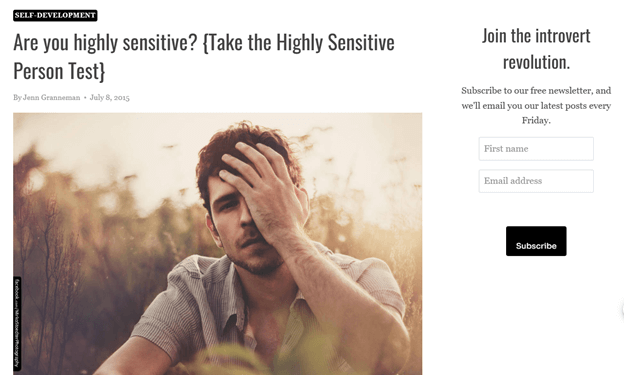
Introvert Dear also presents a set of questions based on Dr. Aron’s HSP Scale. It consists of 23 questions asking about your reactions to certain situations and stimuli. We find this Are you Highly Sensitive? By Introvert Dear test easier to answer since you only have two options—true or false.
When you’re done answering, your results are automatically shown, along with an explanation. You may also share your results through social media platforms like Facebook and LinkedIn. A comprehensive article about HSP is also found on the website.
Final Words on Top Highly Sensitive Tests & Quizzes
If you are curious about where you place on the sensitivity spectrum, these highly sensitive tests and quizzes may be useful.
As usual, it is important to look at these tests simply as guides for determining your personality and behavior. They are in no way intended to be a replacement for diagnosis and treatment by a mental health expert.
Finally, if you want to identify YOUR personality type, then take one of these 11 personality tests to better understand what makes you tick.


